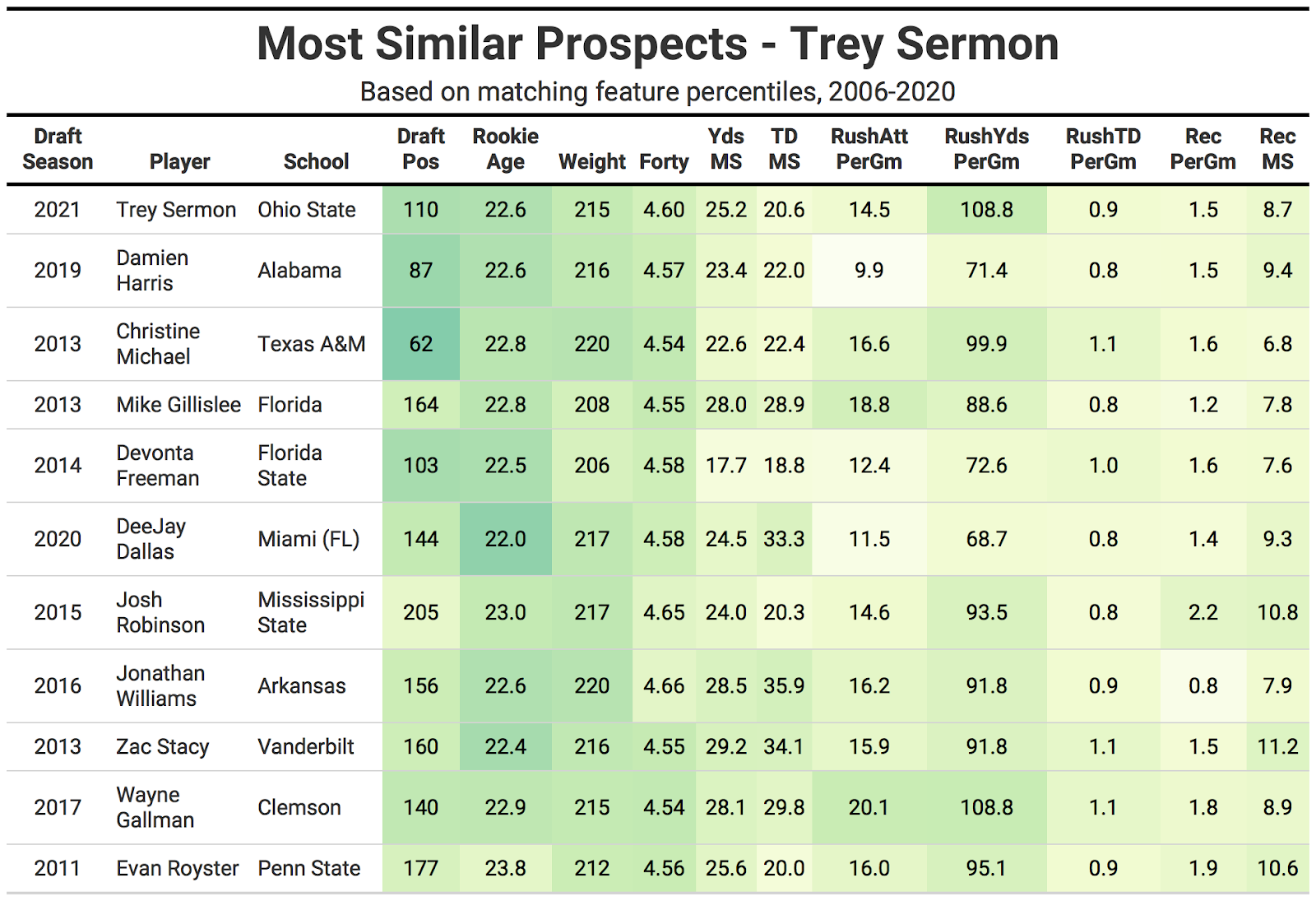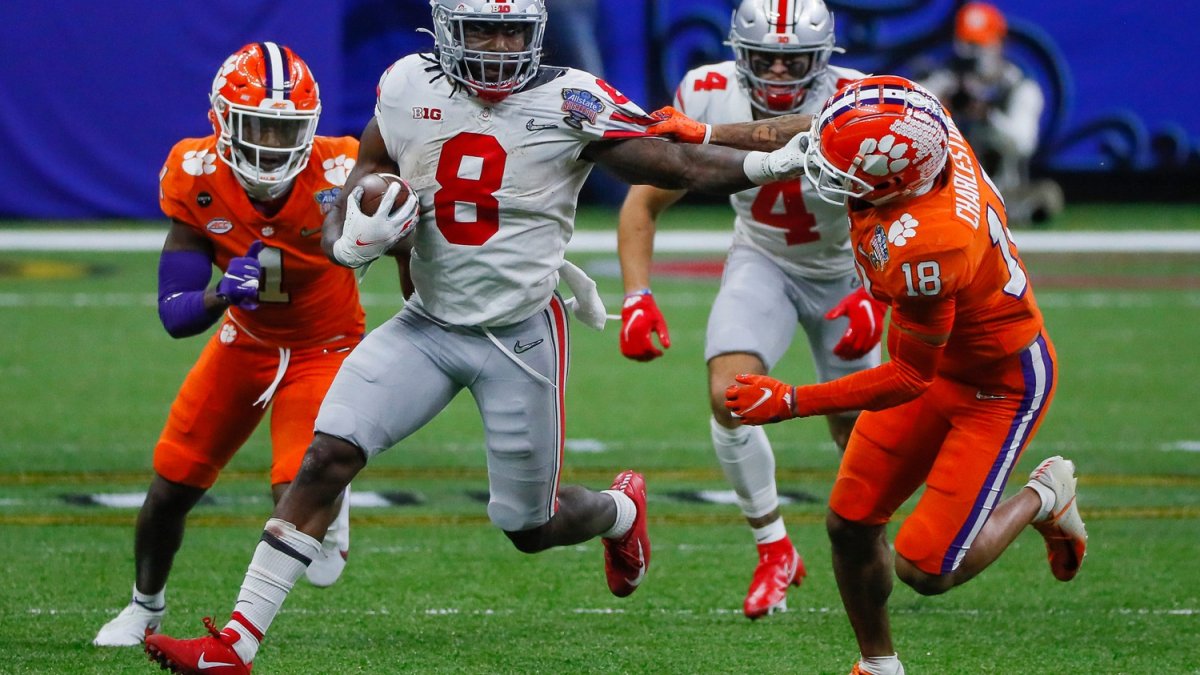Comparing current NFL draft prospects to those of years past is standard procedure in draft evaluation, though most comparisons are built on the memory recall and subjective opinion of the particular evaluator.
This will be the first in a series of articles comparing the 2021 draft prospects to prior years and picking out the most similar comps with a clearly delineated and quantifiable method.
PFF data scientist Eric Eager has done tremendous work building college-to-pro projections, which are built off the robust college data we’ve collected since 2014 and have been applied to exercises like building an “Analytics” Mock. In this analysis, I will use some of our advanced stats for comparison but primarily rely on traditional stats to go back further to compare the 2021 prospects to draft classes going back to 2006.
Without the NFL Scouting Combine this season, the important measurables like weight and 40-yard dash will be reported through the various pro days.
View PFF's 2021 NFL Draft position rankings:
QB | RB | WR | TE | T | iOL | DI | EDGE | LB | CB | S
METHODOLOGY
The comps below were derived from a two-step process. First, I converted all the most statistically relevant stats and measurables to percentiles based on the thousands of prospects who have entered the NFL since 2006 at each position. Then, I filtered the total universe of past prospects by those who had draft positions, weight and 40 times within a 10th percentile in either direction of Ohio State RB Trey Sermon. For undrafted players, I assigned a numerical draft position of 300.
The rest of the matching features were transformed by principal component analysis (PCA). I found the closest statistically comparable players by the euclidean distance between the players' principle components, listed in the top 10 below.
The metrics for PCA are: rushing attempts per game, rushing yards per game, rushing touchdowns per game, receptions per game and market share of team receptions. All of these data points come from the prospect’s best collegiate season. I also matched the prospect’s market share of total team yards and touchdowns to past draft prospects.
For Sermon's draft position, I’m using an estimate based on the mock data collected at GrindingTheMocks.com. For the weight and 40 time, I’m using the numbers from his pro day, with a 0.03-second penalty added to the 40 time to reflect the uncertainty of pro-day timed measurements.
Most comparable players
Sermon's size stands out in a draft class full of prospects who weigh in at or below 200 pounds. He weighed in at 215 pounds for his pro day and ran a mediocre 4.57-second 40-yard dash (38th percentile) but was more impressive in other drills, hitting 37 inches on his vertical (77th), 10-foot-5 on his broad (87th) and 6.83 seconds on the three-cone (87th).
Sermon was reasonably productive in his true freshman and sophomore seasons at Oklahoma before a drop in playing time as a junior led to a graduate transfer to Ohio State for his final season.
He was lightly used in the first half of 2020, never receiving more than 14 touches in any game. He exploded down the stretch with 636 rushing yards in three weeks, including the Big Ten championship game and the first round of the College Football Playoff, before getting injured early in the championship game.
Those higher-profile appearances, along with his top-notch pedigree coming out of high school, could boost his draft stock and lead to early opportunities in the NFL.
Buckeyes are your Big Ten champs ️🏆
Ohio State takes down Northwestern, 22-10
Trey Sermon: 29 carries for 331 yards, 2 TDs pic.twitter.com/eECiYTnamI
— Bleacher Report (@BleacherReport) December 19, 2020

The holistic analysis of Sermon’s stats doesn’t give much to be excited about. His rushing and receiving volume is reasonably mediocre, and he isn’t particularly young, entering the NFL as a senior closer to 23 than 22 years old.
He could have Day 2 draft capital backing him, which would bolster his chance to lead a backfield. That said, the few Day 2 backs among his comps didn’t do much with it in the NFL.
Exclusive content for premium subscribers

WANT TO KEEP READING?
Dominate Fantasy Football & Betting with AI-Powered Data & Tools Trusted By All 32 Teams
Already have a subscription? Log in




 © 2025 PFF - all rights reserved.
© 2025 PFF - all rights reserved.